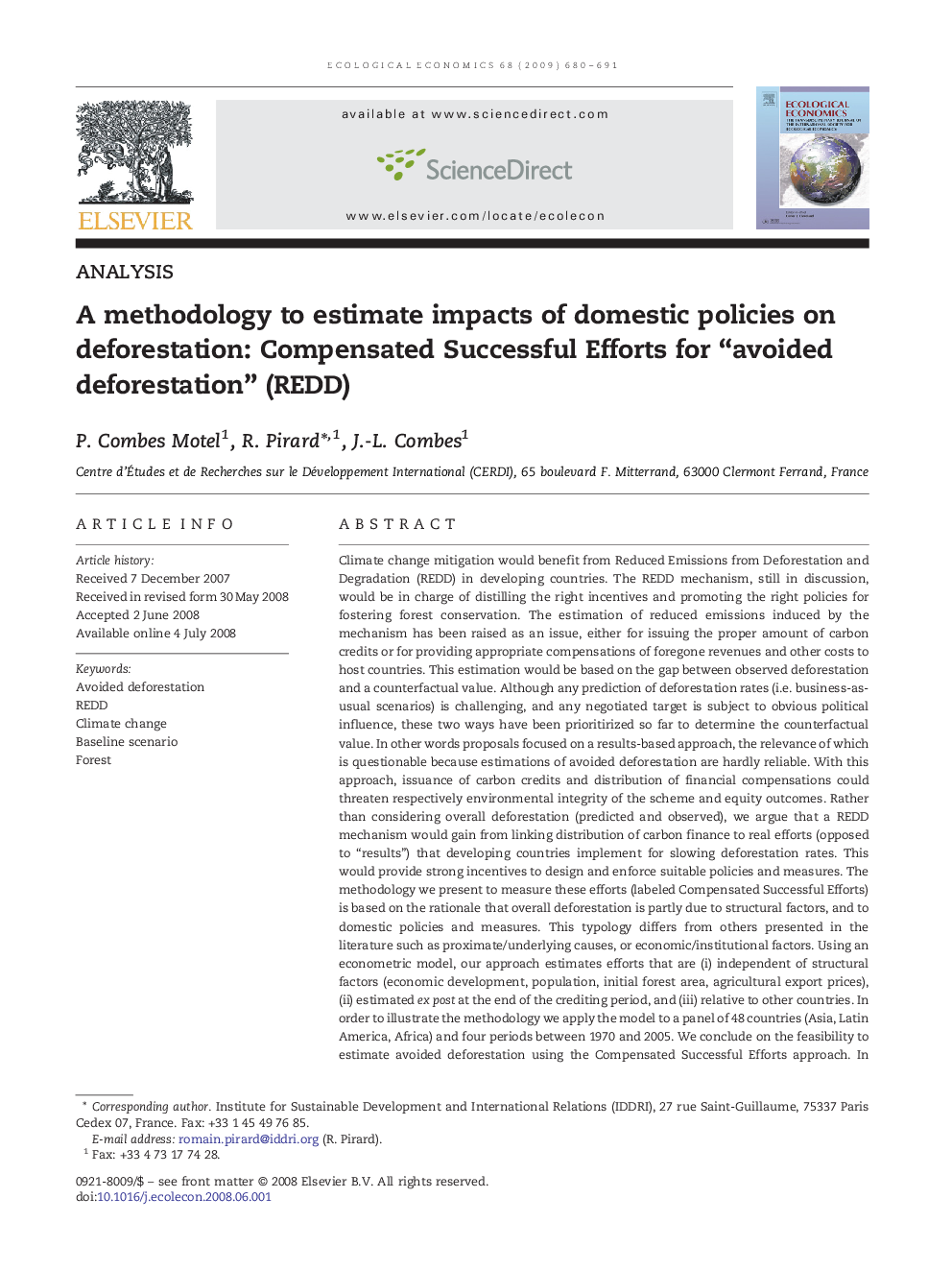| کد مقاله | کد نشریه | سال انتشار | مقاله انگلیسی | نسخه تمام متن |
|---|---|---|---|---|
| 5051609 | 1371130 | 2017 | 12 صفحه PDF | دانلود رایگان |
عنوان انگلیسی مقاله ISI
A methodology to estimate impacts of domestic policies on deforestation: Compensated Successful Efforts for “avoided deforestation” (REDD)
دانلود مقاله + سفارش ترجمه
دانلود مقاله ISI انگلیسی
رایگان برای ایرانیان
کلمات کلیدی
موضوعات مرتبط
علوم زیستی و بیوفناوری
علوم کشاورزی و بیولوژیک
بوم شناسی، تکامل، رفتار و سامانه شناسی
پیش نمایش صفحه اول مقاله

چکیده انگلیسی
Climate change mitigation would benefit from Reduced Emissions from Deforestation and Degradation (REDD) in developing countries. The REDD mechanism, still in discussion, would be in charge of distilling the right incentives and promoting the right policies for fostering forest conservation. The estimation of reduced emissions induced by the mechanism has been raised as an issue, either for issuing the proper amount of carbon credits or for providing appropriate compensations of foregone revenues and other costs to host countries. This estimation would be based on the gap between observed deforestation and a counterfactual value. Although any prediction of deforestation rates (i.e. business-as-usual scenarios) is challenging, and any negotiated target is subject to obvious political influence, these two ways have been prioritirized so far to determine the counterfactual value. In other words proposals focused on a results-based approach, the relevance of which is questionable because estimations of avoided deforestation are hardly reliable. With this approach, issuance of carbon credits and distribution of financial compensations could threaten respectively environmental integrity of the scheme and equity outcomes. Rather than considering overall deforestation (predicted and observed), we argue that a REDD mechanism would gain from linking distribution of carbon finance to real efforts (opposed to “results”) that developing countries implement for slowing deforestation rates. This would provide strong incentives to design and enforce suitable policies and measures. The methodology we present to measure these efforts (labeled Compensated Successful Efforts) is based on the rationale that overall deforestation is partly due to structural factors, and to domestic policies and measures. This typology differs from others presented in the literature such as proximate/underlying causes, or economic/institutional factors. Using an econometric model, our approach estimates efforts that are (i) independent of structural factors (economic development, population, initial forest area, agricultural export prices), (ii) estimated ex post at the end of the crediting period, and (iii) relative to other countries. In order to illustrate the methodology we apply the model to a panel of 48 countries (Asia, Latin America, Africa) and four periods between 1970 and 2005. We conclude on the feasibility to estimate avoided deforestation using the Compensated Successful Efforts approach. In addition to being conservative from an environmental perspective, this approach tends to guarantee fairness by accounting for dramatic changes during the commitment period. Last, such estimations of avoided deforestation could provide guidance for decisions on further financing of national programs to curb deforestation, as it would help to distinguish between successful and unsuccessful policies.
ناشر
Database: Elsevier - ScienceDirect (ساینس دایرکت)
Journal: Ecological Economics - Brought to you by:GAYATRI VIDYA PARISHAD COLLEGE OF ENGINEERING for Women Renewal due by 31 Dec 2017
Journal: Ecological Economics - Brought to you by:GAYATRI VIDYA PARISHAD COLLEGE OF ENGINEERING for Women Renewal due by 31 Dec 2017
نویسندگان
P. Combes Motel, R. Pirard, J.-L. Combes,